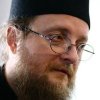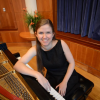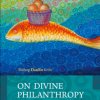Владика Григорије: Тврдош
Свијет је чудесан и неописив. Дотакнути његовом љепотом, понекад успијевамо описати један његов дјелић, с већим или мањим успјехом. Постоје ипак мјеста у овом свијету која није једноставно описати. Тако ме је одувијек чудила немоћ, с једне, и жеља, с друге стране, да опишем манастир Тврдош. Тврдош би био занимљив многима, а посебно сликарима, историчарима, археолозима, писцима.
Манастир је саграђен на мјесту гдје је ток Требишњице најмирнији и истовремено најдубљи и најснажнији. Пратећи пут од Требиња према Тврдошу, Требишњица струји кроз поље, засијецајући га попут сребрних нити под сунцем. У прољеће, храњено њеним водама, поље је зелено и јарко црвено од безброј цвјеталих булки. Безбрижни крајолик, импресиван у бистрини боја, ивиче ћутљива, камена брда, чувајући га од остатка свијета. Иза гребена, који штити манастир од сјеверних и источних вјетрова, ријека изненадно и тихо тече право према Тврдошу и бива мирна и нечујна, да би, чим прође манастир, опет текла брзо и снажно. С југа је манастир благо заштићен малим узвишењем и Требињском шумом, а са сjевера узвишеним каменим гребеном, планином, некад шумовитим Кличањем, које се органски везује за Леотар. Тако ушушкан на тврдој стијени стоји манастир Тврдош.
Јутра у манастиру Тврдош свићу реска и хладњикава. Она су право благо у току љетњих дана и жеге, кад се чује стидљиви цвркут птица, стишаног вјетра који носи ваздух пун морског јода и органских талога океана, здруженог са ароматима боровог честара и вријеска. На први звук клепала, када монаси журно устају из својих постеља и спремају се за јутарњу службу, по Tребињском пољу још има росе. Пут од Требиња ка Поповом пољу сив је и миран, као и пратиља му у вијугању, зелена као маховина, Требишњица, око које се у тај час почињу скупљати чапље, галебови и гњурци.

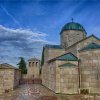
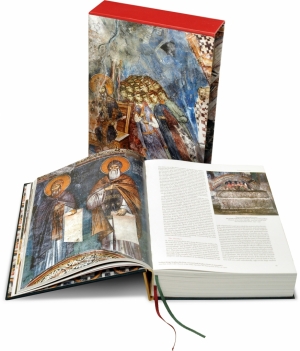 Monumentalna knjiga pod naslovom
Monumentalna knjiga pod naslovom 